
Bipartisan Infrastructure Deal Goes to Vote, Congresswoman Cori Bush Leads Protest for Eviction Moratorium Extension: Aug. 5 Joint Center Roundup
Biden Administration
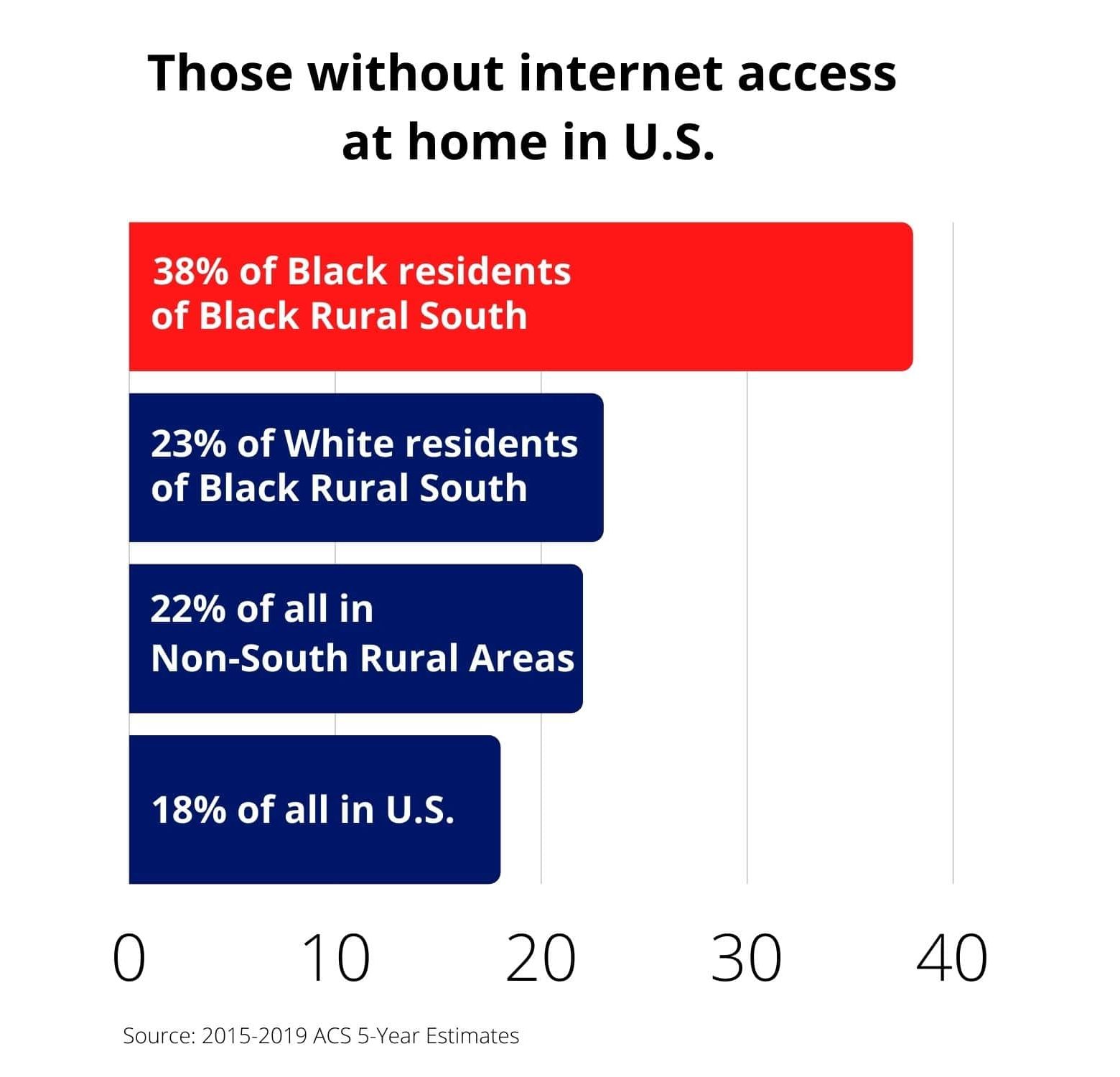
Infrastructure bill contains Joint Center broadband recommendations: CNBC reports the Senate began voting “on ‘multiple’ amendments” to the $1 trillion bipartisan infrastructure bill on Wednesday. If passed, the bill will head to the House next, which “left for its August recess and is not scheduled to return until Sept. 20.” CNBC further notes that “Democrats aim to get both bills to Biden’s desk before Washington’s attention turns to the midterm elections early next year.”
The deal includes provisions that are consistent with recommendations by Joint Center Tech Policy Director Dr. Dominique Harrison in her issue brief on expanding broadband in the Black Rural South, including a $65 billion investment in broadband infrastructure, provisions to end digital redlining, and creating a “permanent program to help more low-income households access the internet.”
In an interview with NewsOne, Cedric Richmond, senior advisor to the president and director of the White House Office of Public Engagement, also shared how the bill will prioritize Black communities through “removing the 10 million lead pipes that deliver water to people’s homes, the 400,000 lead pipes that lead service lines that deliver water to schools disproportionately schools and homes are for people of color” and “cleaning up Superfund sites.” Click here for a summary of how the infrastructure is advancing economic and public health opportunities for communities of color.
Other programs that were cut, such as “investments in housing and education; child care; research and development; manufacturing; and clean energy” will be included in a separate $3.5 trillion that Democrats hope to pass through budget reconciliation, which requires fewer votes.
Workforce provisions included in infrastructure bill: The White House shares that The Bipartisan Infrastructure Investment and Jobs Act will create millions of good-paying jobs, protect critical labor standards on construction projects, grow wages in the clean energy industry, ensure that all taxpayer-funded infrastructure and public works projects are built with American iron, steel, manufactured products, and construction materials, protect and support transit workers, support auto workers, invest in coal and energy communities, and more. Senator Tim Kaine (D-VA) introduced an amendment to include JOBS Act language to expand short-term Pell Grants in the infrastructure package. In July, Joint Center President Spencer Overton called for Congress to pass the JOBS Act and expand Pell Grants to cover high-quality, short-term training.
The Hill

Shontel Brown (above) wins special election to fill Marcia Fudge’s Ohio seat: Shontel Brown, the first woman and Black person to lead the Cuyahoga County Democratic Party, won Tuesday’s special election to fill Ohio’s 11th District seat. Brown, supported by Majority Whip Clyburn (D-SC), CBC Chair Joyce Beatty (D-OH), and House Homeland Security Chairman Bennie Thompson (D-MS) beat several other candidates, including Nina Turner, who was supported by Senator Bernie Sanders (I-VT) and several other national progressive leaders.
The fight for voting rights legislation continues: CBC Members Senator Raphael Warnock (D-GA) and Congressman Al Green (D-TX), Rainbow PUSH Coalition founder and president Rev. Jesse Jackson Sr., and several Democratic lawmakers “rallied” outside the U.S. Capitol on Tuesday to “urge the Senate to delay its summer recess until passing the For the People Act.” State legislators and activists are scheduled to continue holding demonstrations and marches that demand President Biden “increase his pressure on senators to protect voting rights.”
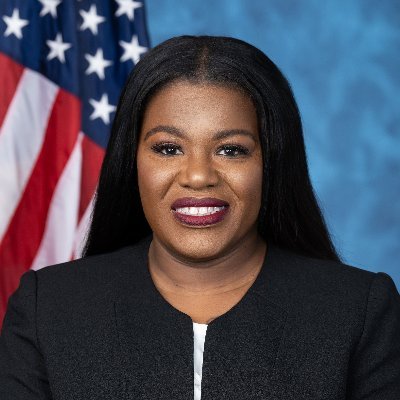
Congresswoman Cori Bush’s (above) leadership steers eviction moratorium extension: Congresswoman Cori Bush (D-MO) led a“one-woman protest” for four consecutive nights outside of the U.S. Capitol in protest of the moratorium lapse forcing the eviction crises “to the top of the nation’s agenda.” The Congressional Black Caucus also called on the White House to extend the federal eviction moratorium to October noting that“thousands of Black families and children could lose the roof over their heads” as the pandemic surges once again. President Biden deemed an eviction moratorium as “worth the risk” and prohibited evictions in counties with high rates of COVID-19 transmission through October 3 despite the“tenuous legal ground” the new order stands on.
Black Women Equal Pay Day: Congressional Black Caucus Chair Joyce Beatty (D-OH) calls for the passing of the Paycheck Fairness Act (summary here) on Black Women’s Equal Pay Day (this past Tuesday) noting the “additional 214 days a Black woman must work to earn that a white man takes home in a year.” Black women are paid only 63 cents for every dollar made by white men.
Lawsuits against Johnson & Johnson: The Subcommittee on Economic and Consumer Policy writes a letter to Johnson & Johnson Chairman of the Board and Chief Executive Officer Alex Gorsky requesting information about plans to seek bankruptcy protection for injuries “allegedly” caused by the company’s talc baby powder. The Subcommittee is particularly interested in understanding how “such a plan might affect victims who were harmed by your talc baby powder.” A separate lawsuit filed by the National Council of Negro Women (NCNW) and prominent civil rights lawyer Benjamin Crump accuses Johnson & Johnson of “specifically marketing its talcum baby powder products to Black women, despite knowing of concerns surrounding its potential links to cancer.”
Appointments

Black women strategizing for Black woman Supreme Court nomination: The Black women behind She Will Rise—Brandi Colander, April Reign, Kim Tignor, and Sabriya I. Wiliams (from left to right)—apply pressure to ensure the first Black woman is appointed to the Supreme Court after Justice Stephen Breyer’s retirement.
Biden appointment data: Roll Call recently covered all three of the Joint Center’s recent report cards on Black representation within the Biden Administration.

Biden nominates Jennifer Clyburn Reed for Federal Co-Chair of the Southeast Crescent Regional Commission: Dr. Reed is a career educator with over 28 years of experience in public and private schools and universities. She is currently the Chief Executive Officer for Palmetto Issues Conference, LLC, an issues-based advisory group that advocates for accessible and equitable policies in education, health, housing and infrastructure.

Earl Adams Jr. appointed as Chief Counsel for the Federal Motor Carrier Safety Administration at the Department of Transportation: Mr. Adams previously served on the Metropolitan Washington Airports Authority board, where he was appointed Chairman in January 2020 . He is the second person from the board to be appointed to a position in the Biden administration. He also previously served as the office managing partner at Saul Ewing Arnstein & Lehr, LLP.
Economic Studies
Redefine full employment: A higher “full employment” benchmark would better narrow the racial employment gap, the Roosevelt Institute argues.
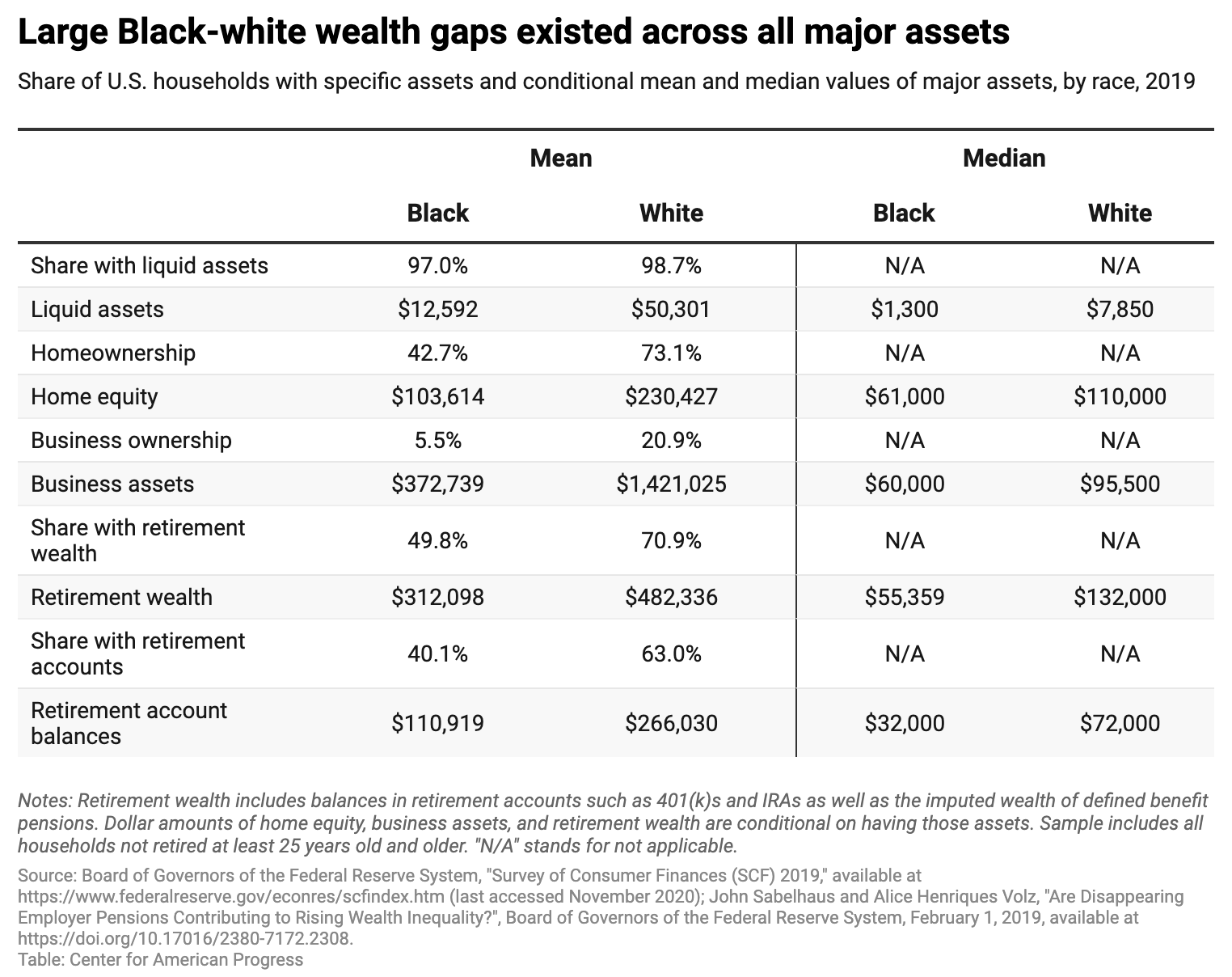
How to close the wealth gap: The Black-white wealth gapwas sizable in 2019. On average, white households had four times the liquid assets as Black households ($12,952 vs. $50,301). The Center for American Progress outlines policies to close the wealth gap, including direct payments to African Americans, low-cost financial services, and access to research funds for Black inventors.
Reverse engineering: Efforts are underway to reconnect Black communities torn apart by highways. Bloomberg explores this “legacy of racist federal transportation policies.”
The Child Tax Credit needs an ad campaign: State and local governments must do more to contact hard-to-reach families eligible for the Child Tax Credit, including Black families, who risk missing out on the monthly payment, the Center on Budget and Policy Priorities argues.
Stimulus support cut poverty: The Urban Institute projects that pandemic-driven stimulus and benefits likely cut poverty in half and will have the largest impact on Black people. The 2021 projected poverty rate is 9.2 percent for Black people, 11.8 percent for Latina/os, 10.8 percent for Asian American and Pacific Islanders, and 5.8 percent for white people.
Resolving land disputes got easier: Black farmers will benefit greatly from the Department of Agriculture’s loans to help resolve land ownership issues. Heir’s property accounts for over one-third of Black-owned land in the South, Politico reports.
Tech Policy
$65B for broadband: Congress and the White House secured $550 billion in federal investments in the nation’s infrastructure. The funding includes $65 billion to expand access to high-speed broadband internet services.

Telehealth opportunities grow: The expansion of telehealth to 3.9 million households during the pandemic is creating new business opportunities. The Joint Center’s Dr. Dominique Harrison told Business Insider that virtual health has helped ease barriers to care, such as lack of transportation. In her recent issue brief on expanding broadband in the Black Rural South, Dr. Harrison states that “telemedicine can connect rural patients to medical specialists and specialty care not available in their community and also lower costs by diverting patients from more expensive care settings.”
Getting online is only half the battle: Although 84 percent of low-income families have internet access—up from 64 percent in 2015—a majority remains “under-connected.” Millions of students have insufficient speeds and connectivity for consistent online learning, EdSurge reports. Affordability remains the biggest barrier to broadband services for under-connected families, though a number of families say there are simply no service providers in their area.
Mismanaged FCC grants: A “clean up” of the Federal Communications Commission’s (FCC) Rural Digital Opportunity Fund is prompting calls for internet service providers to return grant funds awarded under former FCC Chairman, Ajit Pai, Ars Technica reports. “The FCC cited ‘complaints that the program was poised to fund broadband to parking lots and well-served urban areas.’”
Tracking broadcaster diversity once again: After a two-decade lapse, the FCC looks to begin collecting EEOC data again on the race and gender of broadcasters in order to assess diversity in the industry, Politico reports. Federal Communications Commissioner Geoffrey Starks stated that the collection of this data “will help [the FCC] develop a better understanding of the landscape of our media workforce, and the failure to collect it has hampered our ability to determine what regulatory actions are necessary to ensure equal employment opportunities.”
Future of Work & Learning
Wage gap persists: Black women were paid 63 cents for every dollar paid to white men in 2019, the Institute for Women’s Policy Research finds. The wage gap has persisted despite increases in educational attainment among Black women.
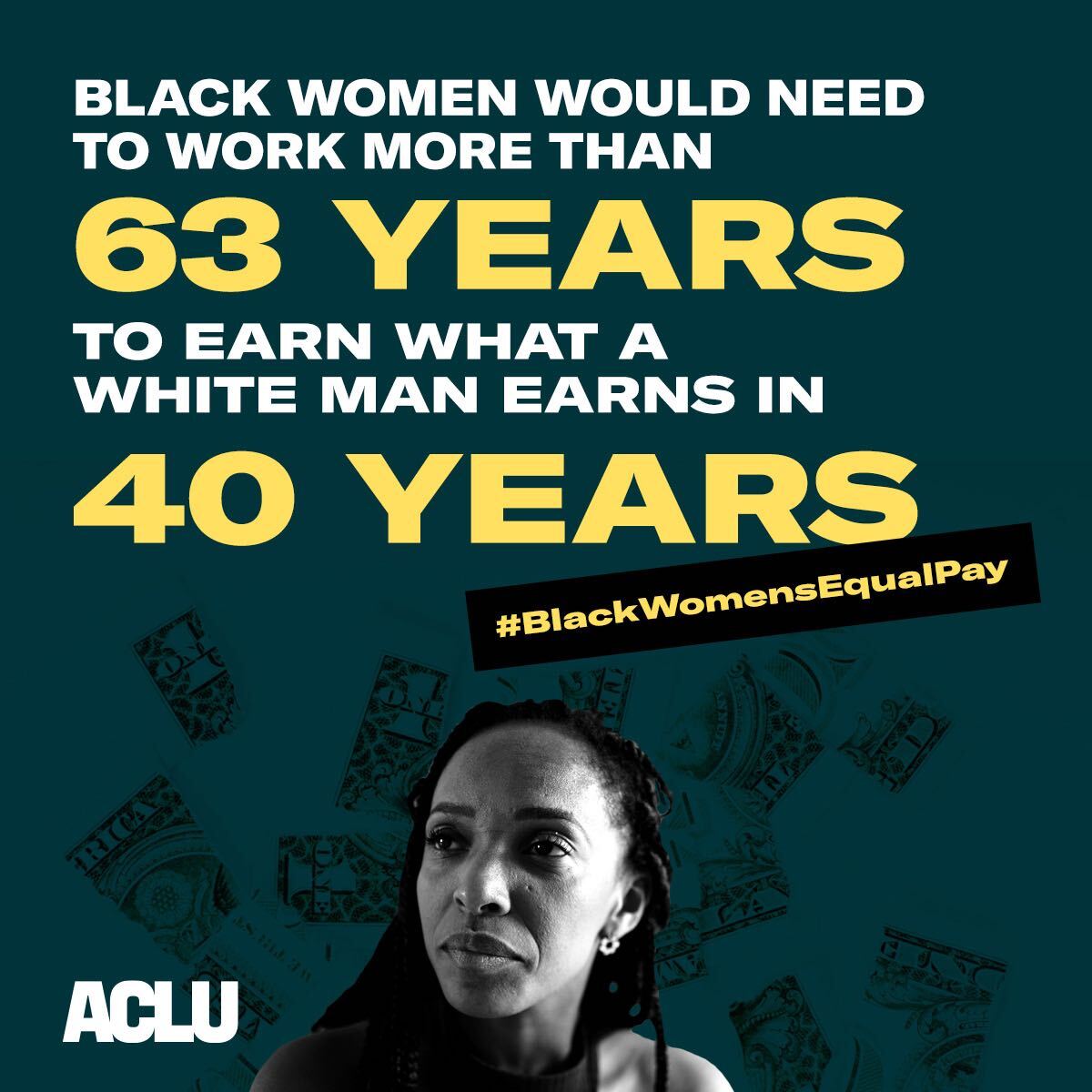
“I quit.”— Worker leverage grows: Low-wage workers, who are often people of color, are quitting their jobs in fast food, retail, and hospitality for better wages, Vice reports, the result of growing leverage from a tight labor market and a better safety net during the pandemic.
George Floyd drove home schooling: Beyond the pandemic, the racial reckoning following George Floyd’s murder was an important reason for a significant bump in home schooling among Black students, the Washington Post reports. Between 2019 and May 2021, home schooling rates jumped from approximately 1 percent to 8 percent for Black students.
Mapping exploitation: A new report examines how predatory for-profit institutions are targeting communities of color, leaving Black students with significant debt for dubious educational programs and exacerbating racial inequality, the advocacy group Protect Borrowers argues.
More needed to get Black men through college: Educators say Black male college students need more resources to help them earn degrees. At Community College of Philadelphia, the retention rate was 30 percent for Black students and 45 percent for white students, Chalkbeat reports. Surveys reveal that Black men experienced the most challenges at college during the pandemic.
Beyond the BA: Black Americans value non-degree credentials more than any other racial group, while white Americans value them the least. Seventy-one percent of Black people said non-degree credentials helped them achieve their goals vs. only 46 percent of white people, the Center for Education Consumer Insights finds.
COVID-19
Vaccination divides: Race is one of the four main fault lines between the vaccinated and unvaccinated, Vox reports. Black people make up 12 percent of the U.S. population but only 9 percent of the vaccinated, based on available race/ethnicity data for 57 percent of people who have received at least one vaccine dose. The other three fault lines are age, income, and politics.
The path forward: Former U.S. Surgeon General Jerome Adams joined Washington Post Live to discuss the Delta variant, vaccines, and other impacts of the pandemic on the nation’s future.
Mask up again: The CDC issued new mask guidelines after research showed that with the Delta variant fully immunized people can still carry the coronavirus, the New York Times reports.
Outsized harm to Black education: The negative impact of the pandemic and racial injustice fell disproportionately on Black students, according to a Columbia University study.
Student debt forgiveness: HBCUs are creating a pathway for students to re-enroll or earn their degrees by using COVID-19 relief funds to forgive debts owed directly to schools.
Political Studies
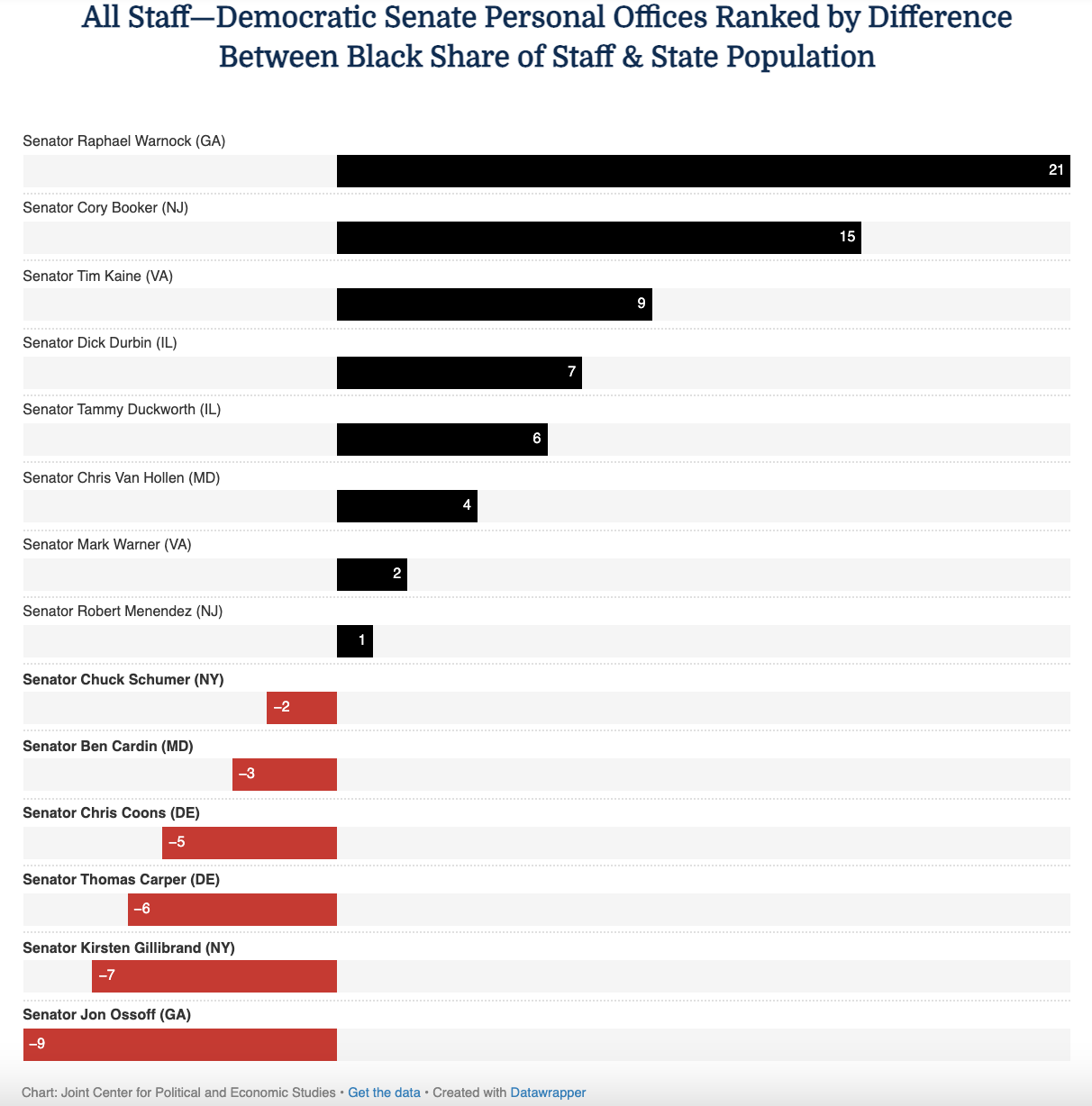
How well do Democratic Senators who represent large populations of Black residents fare in hiring Black top staff? In a blog post, Dr. LaShonda Brenson examines the hiring patterns of Black staff as well at top Black staff in Democratic Senate personal offices that represent states with at least a 15 percent African American population. To date, Senate Republican offices have not released staff demographic data.
Dems are complicit in curbing voting rights: The Atlantic charges the Democratic Party with betraying Black people when it failed to protect Black voting rights amid state GOP-led efforts to restrict voting.
RNC wants the Black vote: In an interview with Essence, a spokesperson for the Republican National Committee and Director of Black Media Affairs, Paris Dennard, appealed to Black voters on behalf of the GOP, citing a platform that supports Black families’ concerns for education, safety, and police reform among other issues and strong Black female leadership in Republican circles.
Justice warns states: The U.S. Justice Department warned states that they could risk violating the Civil Rights Act in any efforts to conduct or consider post-election audits of ballots cast in the 2020 presidential election, Politico reports.
Lower court expansion could lead to greater diversity: Expanding the federal courts system could increase the diversity among judges to better reflect the U.S. population, the Center for American Progress argues. People of color compose 40 percent of the population, while more than 70 percent of federal judges are white.
The power of “no”: The next phase of Black power is the power to say no, an op-ed in Politico argues, as gymnast Simone Biles did when she withdrew from team competition at the Tokyo Olympics. Her withdrawal is an example of Black people opting to protect their vulnerability in the face of pressure from others to perform.
Movement Building
Color of Change issues a petition demanding Olympics’ corporate sponsors to “stand up and publicly demand an end to Rule 50.”
National Black Food Justice and Justice Alliance uplift the farmers and owners of Botanical Bites and Provisions, Anita and Thomas Roberson. Both are passionate about agricultural justice for both Black farmers and Indigenous farmers.
The Lawyers’ Committee for Civil Rights Under Law Stop Hate Project co-leads a community training on hate crimes in Cincinnati, Ohio with their police department.
Events
Upcoming events include “All Politics are Local: School Boards and the Fight for Racial Equity” (The Hunt Institute, August 17) “The Effects of Labor Force Changes: Employment and Retirement Post-pandemic” REMI, August 19); “Summer Storytelling Series- Visioning Black Futures” (Black Futures Lab, August 26).
Last week, events were held by the Brookings Institution, Economic Policy Institute, ERA Coalition, NCNW, Public Private Strategies, The Hill, and Third Way.
Podcasts
State of Black America with Dr. Andre Perry (National Urban League)

